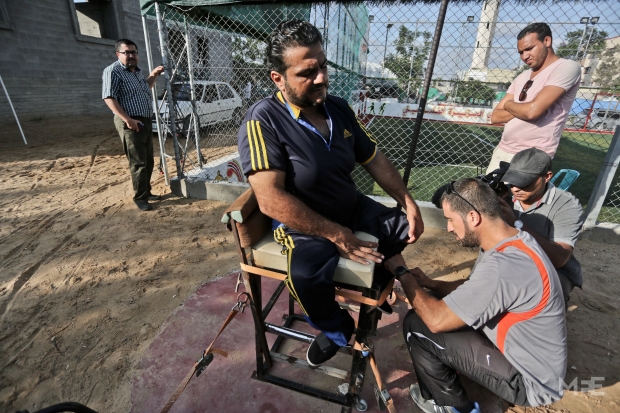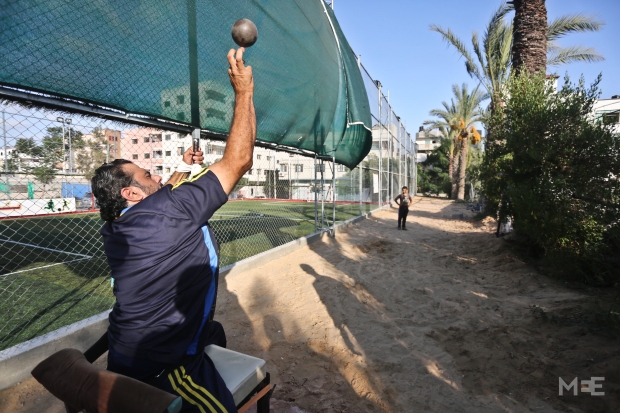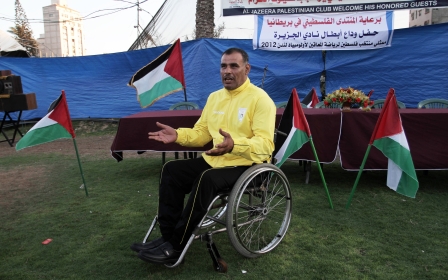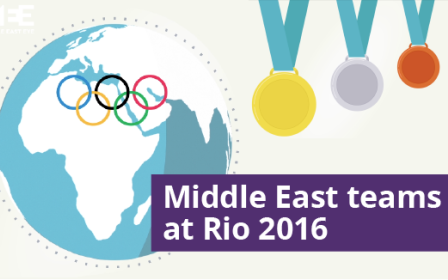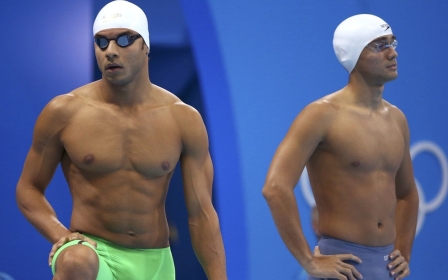This Paralympian from Gaza lives under an Israeli siege. Now he's competing in Rio
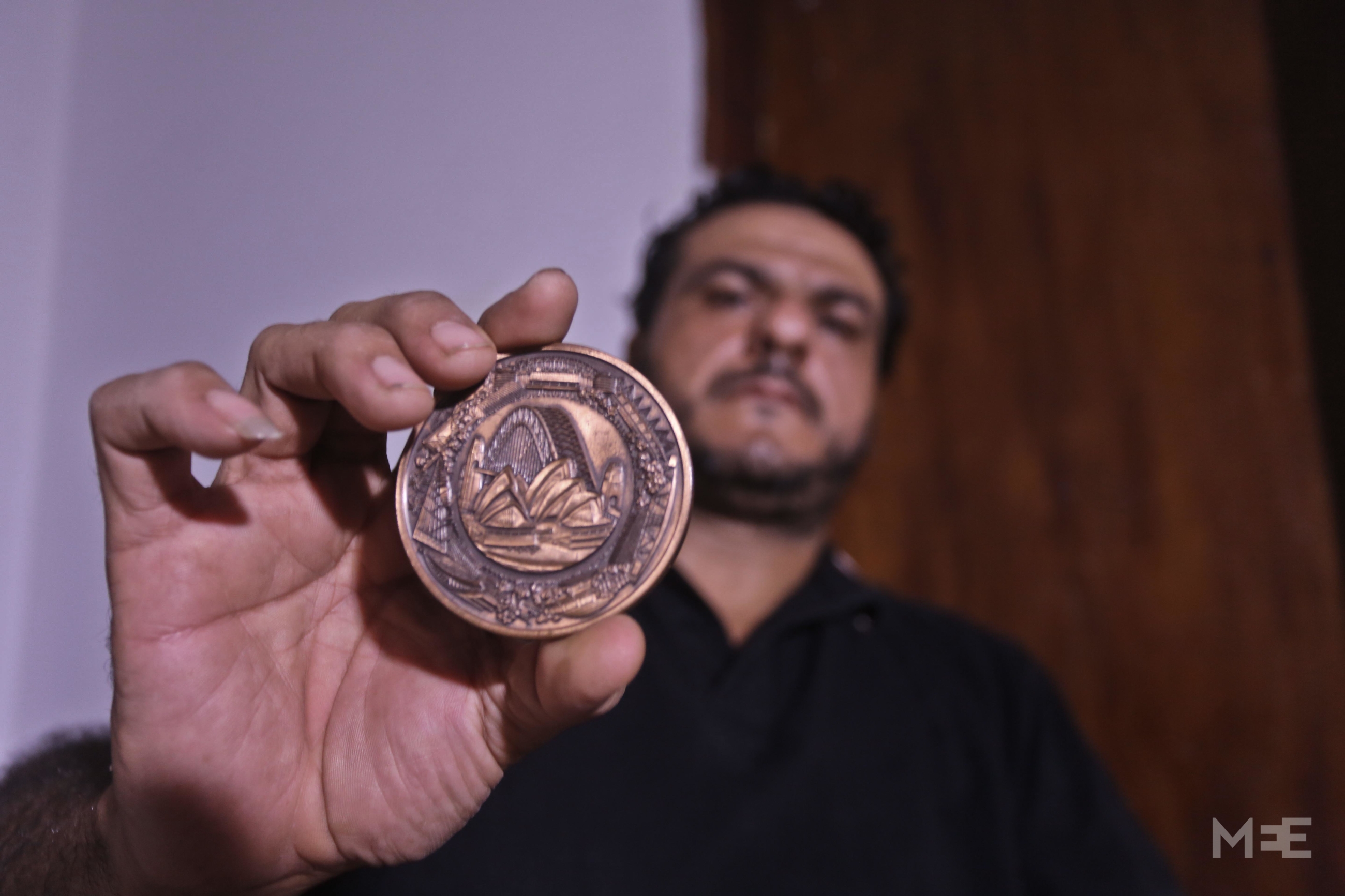
GAZA - Every day Husam Azzam, Gaza's only qualified Paralympic athlete, gets a ride with his coach to his local sports club, Al-Jazeera, in Gaza city. As a shot putter, Azzam knows how important it is to warm up before his session starts and he begins by flexing his muscles while sitting in his wheelchair, as his coach prepares a special metallic seat used specifically for training that is fixed to the ground.
Accommodating for his disability was by no means the only obstacle he faced in the run up to taking part in the Paralympics in Rio this year. For a start, his training schedule was restricted by the availability of the club's limited space near the football field.
Equipment is also hard to come by due to the ongoing siege of the Gaza Strip by Israel and Egypt, which was put in place after Hamas came to power in 2007. In Gaza as elsewhere in the occupied territories, politics inevitably affects sportspeople vying to be their country's best at Rio's Paralympics this month.
Mohammed Dahman, Azzam’s coach since 2001, confirmed that training conditions are not normal and do not match international standards, though they are very grateful for the support they have been given by their sports club. “Al-Jazeera club generously gave us this place to train in, but it doesn't have the required equipment for such sport,” Dahman explained.
“With this rusty chair, sandy ground, and no more than two shots, we cannot practise normally,” he added.
Yet with the help of his coach, Azzam gives it his all, managing to sit in his training chair and throwing the 7.260-kilogram shots with all his might.
Azzam has been working hard for the past year getting in shape for the games. Suffering from infantile paralysis at the age of three did not hinder his determination and belief in his fourth participation in the Paralympics.
“When my health deteriorated, at the age of three, I was too young to really understand that I was becoming disabled, and so it just became a part of my life. When I realised that I wouldn’t be able to move my legs anymore, I decided to overcome my disability through sport,” said Azzam.
The very fact that this Paralympic champion is training to take part in the games at all is extraordinary given the tragedy that befell him seven years ago - Azzam lost his entire family. Despite the terrible grief caused by the loss of his wife, son and parents, he eventually returned to sport and set his sights on participating in the 2016 Paralympics. When he finally did get to Rio, Azzam proudly represented Palestine by putting every ounce of energy into his pursuit of a win for his homeland. Although this time around he did not obtain a medal, Azzam will continue to be an inspiration to Palestinians everywhere.
International and regional accomplishments
The 40-year-old athlete has been playing parasports for 18 years. “I started playing in 1998,” Azzam told Middle East Eye while warming up at the club. “I started as a wheelchair basketball player. Then, when the Palestinian Disabled Sports Federation was established and new sports were added, I chose the shot put because it needs strength and determination.”
In 2000, during the Sydney Summer Paralympics, Azzam entered sports history when he won the first Olympic medal in the history of Palestine. “My bronze medal in Sydney was my greatest honour. It was the first medal for Palestine in the Olympic games, and we, the disabled, gained it,” he continued. “The achievement in Sydney inspired me to work harder. The popularity of disabled sports markedly increased after that too. I think that year we really helped to raise the public awareness of parasports.”
Politics and conflict are never too far away when you are a Palestinian, and this is particularly so when you are a Palestinian living under siege in Gaza.
“After Sydney, national institutions started to be more interested in us and in our sport, but the situation changed because of the 2000 Intifida and the 2007 Palestinian division.”
Azzam continued to make history anyway, winning a silver medal at the 2002 World Championships in athletics in France. In addition, he won another silver medal when he broke a Paralympic record in the 2004 Athens Olympics. “My passion knew no limits. I kept winning medals in every international, Asian and Arab championship.”
“My international experiences taught me not to give up and helped me to build relationships with athletes from all around the world,” Azzam said. “Those relations enriched my personality and my athletic experience by putting me in touch with highly qualified athletes and coaches."
An iron will, despite all woes
In 2009, Azzam decided to retire for social and personal reasons after he lost most of his family. At the time, he was living in Jabaliya refugee camp, in the northern Gaza Strip, when he evacuated from the area under fire from Israeli aircraft.
After the end of the aggression, he returned to his house to find that it had been directly targeted by an Israeli rocket and his life was never the same.
“My parents, my wife, and my son had also passed away in a short period. That left me in a state of severe grief and isolation,” he said.
In trying to piece his life together, he searched for the medals that he identified with, only to find that most of them were gone.
“I also lost most of my medals when my house was targeted by an Israeli airstrike during the 2008 war on Gaza. I felt that I had lost everything.”
Fortunately, he found the Sydney bronze medal in the midst of the rubble. “It’s my first and favourite medal. I found it with some other medals. In fact, I can’t imagine what I would do if I had lost it too,” he added.
For seven years, Palestinian athletes had not won any medals in international or regional competitions. Hence, Azzam’s coach and peers encouraged him to go back on his decision to retire, and so he did. “In 2015, I decided to go back to training in order to participate in [the] 2016 Rio Paralympics,” Azzam said.
After years of Palestinian athletes being absent from the sports podium, the Palestinian Disabled Sports Federation was given a place for one athlete in Rio. An internal championship was held to choose the representative of Palestine and Azzam took first place. “We used to have more Palestinian players in our previous participation. Being the only Palestinian is a big responsibility on one hand, but on the other hand it gives me extra determination to win and to do my best,” Azzam explained.
The siege and the absent official support
Azzam and his coach were meant to have three external training camps in Tunisia, Chile and Brazil, but because of the continuous closure of Rafah crossing between Gaza and Egypt, and the extreme difficulty of leaving from the Erez crossing between Gaza and Israel, they could not leave Gaza to attend these international camps.
“We contacted some of our friends in other national teams, they have been in external training camps since months,” the coach said. “It’s very disappointing. We are not terrorists or militants to be refused by all sides in this way. Although we were officially invited by International Paralympic Committee, the Israeli authorities refuse to give us permissions to leave from Erez, and the opening of Rafah crossing remains a far dream,” he added.
Dahman insisted on the importance of official authorities - such as the Palestinian Paralympic Committee, the International Paralympic Committee, and human rights organisations - supporting the rights and needs of disabled athletes, mentioning that parasports professionals are often neglected. “Officials think that disabled sports are for entertainment. They don’t know that it’s very competitive and tough. There are a group of very good athletes here in Gaza, but no one is interested in improving their abilities. Furthermore, our sports need a lot of special equipment which don’t exist in Gaza.”
The team kept working without any confirmation for their permissions and visas. Only days before the games began, Azzam said: “We exercise in abnormal circumstances without the help of any side. We have been training for more than a year, and now we aren’t sure if we will go to Rio or not.”
Then on 3 September, Azzam and his coach Mohammed Dahman left Gaza from Erez crossing, after the intervention of the International Paralympic Committee. They reached Rio on 5 September, two days before the beginning of the games. “We had started to lose hope. It was a miracle,” Dahman ended.
Future of parasports
“We have 200 disabled athletes in Gaza, they are distributed across 15 local clubs,” said Ali al-Nazly, the technical officer and a member of the management board of the Palestinian Paralympic Committee. “The role of the committee is very limited due to the lack of resources and the disastrous siege which affects every Gazan’s life.”
According to Nazly, the Paralympic Committee and the local clubs try their best and cooperate to improve the situation of parasports in Palestine. “We strive in order to provide better conditions for our athletes. We have plans to build new clubs, fields, and institutions, but we cannot proceed without having the required fund and support.”
Nazly asked the international community for more attention to the situation of parasports in Gaza. “The international community, the International Paralympic Committee, and human rights organisations should do their duty towards those athletes and their rights, especially the right to move freely. External training camps are essential in this sport. It is also worth mentioning that some athletes need to travel for medical purposes.”
“Husam’s arrival to Rio inspires all of his peers who have the dream of participating in international events. His success boosts many other athletes to be in his place. We will work hard in the coming years in order to have more professional athletes who can make history in the next Olympics,” Nazly added.
This article is available in French on Middle East Eye French edition.
New MEE newsletter: Jerusalem Dispatch
Sign up to get the latest insights and analysis on Israel-Palestine, alongside Turkey Unpacked and other MEE newsletters
Middle East Eye delivers independent and unrivalled coverage and analysis of the Middle East, North Africa and beyond. To learn more about republishing this content and the associated fees, please fill out this form. More about MEE can be found here.


